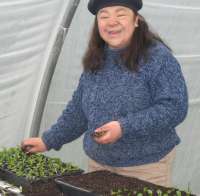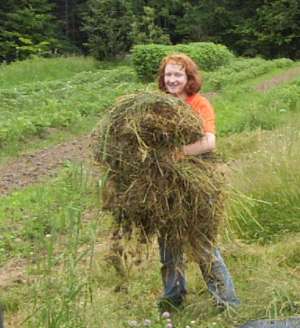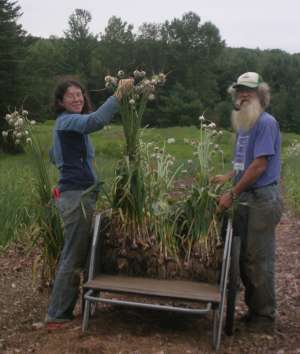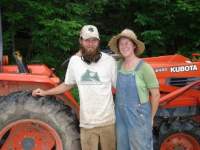Working at

INTRODUCTION
 There are three ways workers are integrated into our farm:
There are three ways workers are integrated into our farm:
In all cases previous farm or garden experience is highly valued.
You can find a lot more about us by looking at our web site at www.snakeroot.net/farm. It is fairly extensive, and includes pictures of us, of the farm, and some of our farmers’ markets, yearly work schedules, as well as literature we produce for educating the public at the markets. We have no livestock.
Work at the farm consists of greenhouse work (starting seedlings, trellising, watering), field work (planting, transplanting, weeding, hoeing, watering, harvesting), attending farmers’ markets, and generally helping out around the place. A more complete description of what we do during the year can be found at Our Work Schedule.
 We’d like to know a little about the folks who are applying to work at our farm for the coming season. Please feel free to write us about yourself, and if you think we missed any details.
We’d like to know a little about the folks who are applying to work at our farm for the coming season. Please feel free to write us about yourself, and if you think we missed any details.
PAID HOURLY WORK
This is for those who wish to work either occasionally or regularly, and commute from home. You fill in a time card for each day you work. We develop a work schedule that meets both of our needs, and expect you to stick to it since we’ll be depending upon your help at various times. Our season for hiring hourly workers is from April to November.
We currently (2009) pay $8 an hour.
SUMMER INTERNS
A summer internship is designed for students looking for summer work. We are looking for people who ideally are willing to start early in the season and stay late in the season (April thru November), but we realize that in most cases this is a dream, so we are flexible on starting and ending dates. Usually the season that works for most interns is from May or June (when our work schedule begins to move into high gear) until late August or September (when work is at its busiest), but determined by the applicant’s schedule.
 Interns get meals and a place to stay, shower and laundry privileges, and time off as negotiated. The type of work is more varied than that of hourly workers, and somewhat depends on initiative and previous experience.
Interns get meals and a place to stay, shower and laundry privileges, and time off as negotiated. The type of work is more varied than that of hourly workers, and somewhat depends on initiative and previous experience.
While a pre-season visit is not absolutely necessary, it is a good idea to plan one in order to lessen possible “culture shock”of working at an ongoing farm.
Stipend is $100 per week, although if you value the experience sufficiently we might consider charging you tuition instead 😉
See our Intern & Apprentice Application Form.
APPRENTICES
 Apprenticeship differ from summer internships in that the work season is year-round, and the term is multi-year. Previous farming experience, while highly valued, is not as important at the ability to apply yourself and to work diligently. We host up to two apprentices at a time.
Apprenticeship differ from summer internships in that the work season is year-round, and the term is multi-year. Previous farming experience, while highly valued, is not as important at the ability to apply yourself and to work diligently. We host up to two apprentices at a time.
We would like our apprentices to be real apprentices in the old time sense of the word, where the apprentice learns to do what we are doing from top to bottom. We are primarily interested in hosting people who have a genuine interest in adopting farming or market gardening in their lives. We are not particularly interested in just a warm body to do work; our hourly workers are for that. Our wish is to gain fulfillment ourselves through offering an in depth experience to people who are looking to continue on in agriculture as their life’s work.
Apprentices get meals and a place to stay, shower and laundry privileges, and time off as negotiated. The type of work is more varied than that of interns and hourly workers, includes involvement in farm management, and somewhat depends on initiative and previous experience.
A farm visit prior to acceptance is essential, both to lessen any “culture shock”, and so we may both get to know who we will be living with over the next year or so. If you are coming from afar, we can provide overnight accommodations.
Stipend is negotiable.
See our Intern & Apprentice Application Form.
